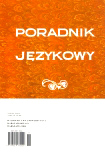O POJĘCIU I TYPACH INTERNACJONALIZMÓW SEMANTYCZNYCH
On the Notion and Types of Semantic Internationalisms
Author(s): Andrzej MarkowskiSubject(s): Language and Literature Studies
Published by: Dom Wydawniczy ELIPSA
Keywords: wyrazy zapożyczone; anglicyzmy semantyczne; neosemantyzmy; internacjonalizmy semantyczne; leksem wieloznaczny;
Summary/Abstract: There is a thesis in the article saying that the latest semantic borrowings of English origin in Polish (e.g. kondycja [condition] 'state, situation', prezydent [president] 'president, chairman', wyzwanie [challenge] 'urgent and important problem to solve') have given way to new semantic internationalisms. A semantic internationalism is a common meaning of a polysemous lexeme occurring in different languages, while its other meanings are not the same in different languages. Acquisition of new international meanings by lexical units of a given language may result in appearance of a complete lexical internationalism (compare contemporary meanings of polysemous lexemes artykułować / artikulovat / artikulieren [articulate]; nostalgia/ nostalgie/ Nostalgie) or in a new intersemantism formation in the area of a polysemous lexeme (e.g. sentymentalny/ sentimentalni/ sentimental). Semantic internationalisms can appear through the borrowing of meaning from a foreign language in the area of a native lexeme (compare the new meaning of the Polish dokładnie, German genau and Czech pøesnì created as a copy of the English exactly). There are examples of intersemantisms reduced to a certain variation of language (e.g. sports - dywizja/ divize/ division). When does a semantic borrowing have the best chance to become a semantic internationalism, accepted in a given language - is indicated in the final part of the article.
Journal: Poradnik Językowy
- Issue Year: 2004
- Issue No: 02
- Page Range: 39-50
- Page Count: 1
- Language: Polish
- Content File-PDF

